
Riley B. King, known professionally as B. B. King, was an American blues guitarist, singer, songwriter, and record producer. He introduced a sophisticated style of soloing based on fluid string bending, shimmering vibrato, and staccato picking that influenced many later blues electric guitar players. AllMusic recognized King as "the single most important electric guitarist of the last half of the 20th century".

Booker T. & the M.G.'s were an American instrumental, R&B, and funk band formed in Memphis, Tennessee, in 1962. The band is considered influential in shaping the sound of Southern soul and Memphis soul. The original members of the group were Booker T. Jones, Steve Cropper (guitar), Lewie Steinberg (bass), and Al Jackson Jr. (drums). In the 1960s, as members of the Mar-Keys, the rotating slate of musicians that served as the house band of Stax Records, they played on hundreds of recordings by artists including Wilson Pickett, Otis Redding, Bill Withers, Sam & Dave, Carla Thomas, Rufus Thomas, Johnnie Taylor and Albert King. They also released instrumental records under their own name, including the 1962 hit single "Green Onions". As originators of the unique Stax sound, the group was one of the most prolific, respected, and imitated of its era.
Electric blues is blues music distinguished by the use of electric amplification for musical instruments. The guitar was the first instrument to be popularly amplified and used by early pioneers T-Bone Walker in the late 1930s and John Lee Hooker and Muddy Waters in the 1940s. Their styles developed into West Coast blues, Detroit blues, and post-World War II Chicago blues, which differed from earlier, predominantly acoustic-style blues. By the early 1950s, Little Walter was a featured soloist on blues harmonica using a small hand-held microphone fed into a guitar amplifier. Although it took a little longer, the electric bass guitar gradually replaced the stand-up bass by the early 1960s. Electric organs and especially keyboards later became widely used in electric blues.

Booker Taliaferro Jones Jr. is an American musician, songwriter, record producer and arranger, best known as the frontman of the band Booker T. & the M.G.'s. He has also worked in the studios with many well-known artists of the 20th and 21st centuries, earning him a Grammy Award for Lifetime Achievement.

Steven Lee Cropper, sometimes known as "The Colonel", is an American guitarist, songwriter and record producer. He is the guitarist of the Stax Records house band, Booker T. & the M.G.'s, which backed artists such as Otis Redding, Wilson Pickett, Sam & Dave, Carla Thomas, Rufus Thomas and Johnnie Taylor. He also acted as the producer of many of these records. He was later a member of the Blues Brothers band. Rolling Stone magazine ranked him 36th on its list of the 100 greatest guitarists of all time, while he has won two Grammy Awards from his seven nominations.
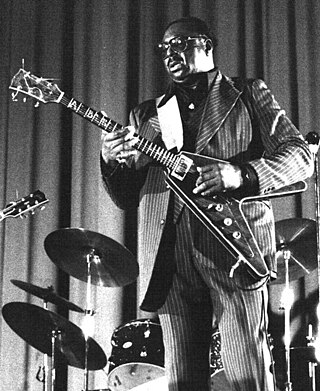
Albert Nelson, known by his stage name Albert King, was an American guitarist and singer who is often regarded as one of the greatest and most influential blues guitarists of all time. He is perhaps best known for his popular and influential album Born Under a Bad Sign (1967) and its title track. He, B.B. King, and Freddie King, all unrelated, were known as the " The three Kings of the Blues". The left-handed Albert King was known for his "deep, dramatic sound that was widely imitated by both blues and rock guitarists".

Donald "Duck" Dunn was an American bass guitarist, session musician, record producer, and songwriter. Dunn was notable for his 1960s recordings with Booker T. & the M.G.'s and as a session bassist for Stax Records. At Stax, Dunn played on thousands of records, including hits by Otis Redding, Sam & Dave, Rufus Thomas, Carla Thomas, William Bell, Eddie Floyd, Johnnie Taylor, Albert King, Bill Withers, Elvis Presley, and many others. In 1992, he was inducted in the Rock and Roll Hall of Fame as a member of Booker T. & the M.G.'s. In 2017, he was ranked 40th on Bass Player magazine's list of "The 100 Greatest Bass Players of All Time".

William Frederick Gibbons is an American rock musician, best known as the guitarist and primary vocalist of ZZ Top. He began his career in Moving Sidewalks, who recorded Flash (1969) and opened four dates for the Jimi Hendrix Experience. Gibbons formed ZZ Top in late 1969 and released ZZ Top's First Album in early 1971. He has also maintained a solo career in recent years, starting with his first album Perfectamundo (2015).

The Gibson Flying V is an electric guitar model that was originally introduced by Gibson in 1958. The Flying V offered a brand new, radical, "futuristic" body design, much like its siblings: the Explorer, which was released the same year, and the Moderne, which was designed in 1957 but not released until 1982. The initial run of guitars used a distinctive wood of the Limba tree marketed by Gibson under the trade name "korina"; later models used more conventional woods.
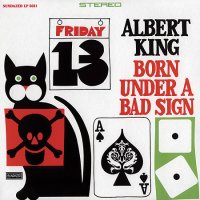
Born Under a Bad Sign is the second compilation album by American blues musician Albert King, released in August 1967 by Stax Records. It features eleven electric blues songs that were recorded from March 1966 to June 1967, throughout five different sessions. King played with two in-house bands: Booker T. & the M.G.'s and the Memphis Horns. Although the album failed to reach any music chart, it did receive positive reviews from music critics and is often cited as one of the greatest blues albums ever made. Born Under a Bad Sign influenced many guitarists, including Eric Clapton, Mike Bloomfield, Jimi Hendrix, and Stevie Ray Vaughan. Born Under a Bad Sign has been recognized by several music institutions, and has been inducted into the Blues Foundation Hall of Fame, the Grammy Hall of Fame, and the National Recording Registry.

The Blues Don't Change is an album by American blues musician Albert King. He recorded it at the Stax Records studio in Memphis, Tennessee, in 1973 and 1974. In 1977, Stax released the album with the same songs and running order as The Pinch.
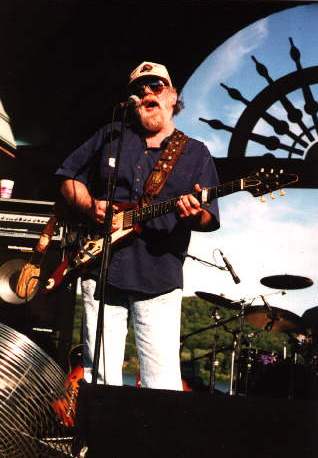
Lonnie McIntosh, known as Lonnie Mack, was an American singer-songwriter and guitarist. He was influential in the development of blues rock music and rock guitar soloing.

William Bell is an American soul singer and songwriter. As a performer, he is probably best known for his debut single, 1961's "You Don't Miss Your Water"; 1968's top 10 hit in the UK "Private Number", a duet with Judy Clay; and his only US top 40 hit, 1976's "Tryin' to Love Two", which also hit No. 1 on the R&B chart. Upon the death of Otis Redding, Bell released the well-received memorial song "A Tribute to a King".
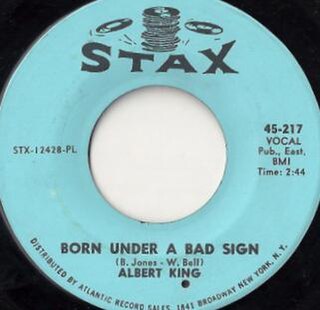
"Born Under a Bad Sign" is a blues song recorded by American blues singer and guitarist Albert King in 1967. Called "a timeless staple of the blues", the song also had strong crossover appeal to the rock audience with its synchronous bass and guitar lines and topical astrology reference. "Born Under a Bad Sign" appeared on the R&B chart and became a blues standard.

"Crosscut Saw", or "Cross Cut Saw Blues" as it was first called, is a hokum-style song "that must have belonged to the general repertoire of the Delta blues". Mississippi bluesman Tommy McClennan's recording of the song was released in 1941 and has since been interpreted by many blues artists. "Crosscut Saw" became an early R&B chart hit for Albert King, "who made it one of the necessary pieces of modern blues".
Albert King (1923–1992) was an American blues guitarist and singer who was active from the late 1940s to 1992. During the earlier part of his career, he recorded several singles for smaller record labels. In 1966, he began an association with Stax Records, where he enjoyed his greatest commercial success with both singles and albums. His 1967 album, Born Under a Bad Sign, has been acknowledged as one of the most important blues albums.
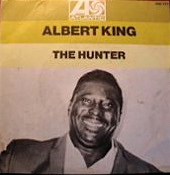
"The Hunter" is a blues song first recorded by Albert King in 1967 for his landmark album Born Under a Bad Sign. It was written by Stax Records' house band, Booker T. and the MGs, and Carl Wells. Along with "Born Under a Bad Sign" and "Crosscut Saw", "The Hunter" is one of King's best-known and most-recorded songs. In 1969, Ike & Tina Turner's version reached the singles charts in the U.S.

Dan Erlewine is an American luthier and the author of five books about guitar repair. He has made instructional videos about the luthier trade since 1983. He works for a luthier supply company, Stewart-Macdonald (StewMac).
















